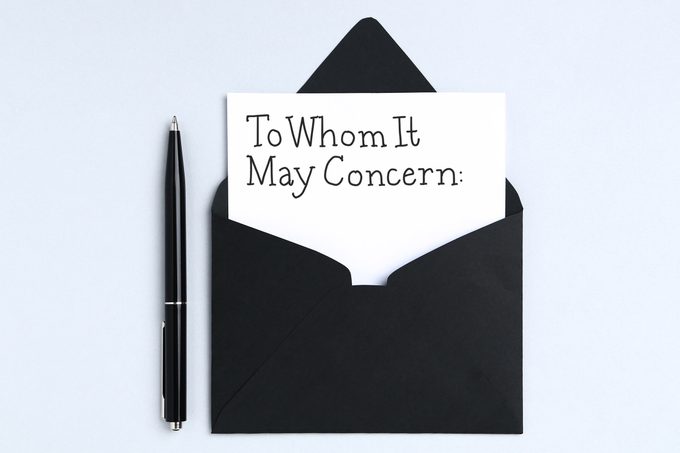Writing an important letter to someone you don't know? Here's how to use "To Whom It May Concern" correctly.

To Whom It May Concern: What It Means and How to Use It

You’ve probably heard or come across this greeting, likely in your professional life: “To Whom It May Concern.” It’s commonly used as the opening line in a letter or email to people we don’t know, and who may be in a position of authority. But what does it really mean, and when should we use it?
Read on as we delve into the details of this formal salutation, plus how to begin letters and emails with it—and when you really shouldn’t.
Get Reader’s Digest’s Read Up newsletter for more etiquette, humor, cleaning, travel, tech and fun facts all week long.
What does “To Whom It May Concern” really mean?
The phrase basically means “To whomever is the most appropriate recipient of this correspondence.” The “it” in “To Whom It May Concern” refers to the contents of the correspondence or letter, be that a complaint, a job application or a testimonial. You’re basically requesting that your letter reach the most relevant person. It’s accepted as a standard greeting, as it’s an unlikely word or phrase to get wrong.
The problem with “To Whom It May Concern”
People often ask if it’s correct to say “To Whom It May Concern.” You may have heard that this greeting is outdated or stuffy, even impersonal, and career experts discourage people from using it in job applications and cover letters. The reason? Using “To Whom It May Concern” indicates that you didn’t do the research necessary to identify the correct recipient of your letter or resume.
When to use “To Whom It May Concern”
The benefit of using “To Whom It May Concern” is that it gives you an applicable greeting to use when you simply don’t know the recipient of your letter. If you’re writing to a faceless customer service representative, for instance, “To Whom It May Concern” is appropriate.
However, if it’s a person you hope to have a future relationship with, like a potential boss, you’ll want to make an effort to find out exactly who that is.
And if you do know who your letter is going to, use their name! Even if you have an idea of who it’s going to, use that name. If you aren’t able to find the name of the person in the position you’re sending your letter to, use the title of the position instead. Most job recruiters will find “Dear Executive Editor” preferable to the generic “To Whom It May Concern.”
Do you really need to capitalize every letter?
The words that make up the phrase “To Whom It May Concern” are not proper nouns or names. So why is the greeting often formatted with them all capitalized? Well, they don’t necessarily have to be capitalized, but that is how people often prefer to format it, thinking that it looks better that way as a greeting. Experts explain that “To Whom It May Concern” serves as a replacement for someone’s name, so capitalizing the phrase conveys the same level of respect and formality as addressing someone by name.
Why not who?
The difference between who and whom is a common grammar conundrum, but the basic rule is that who refers to the subject of a sentence or clause, while whom refers to the object. In this case, it is the subject, and whom is the object of the verb phrase may concern. So whom is the correct choice.
A colon, not a comma?
When you start writing a letter, you usually follow the greeting with a comma (for example, “Dear Mom, …). Should “To Whom It May Concern” be followed by a comma too?
Again, this is not set in stone, but using a colon is generally considered more formal. If you’re writing a business letter or applying for a job, formal is the way to go. Commas work better for personal correspondence.
Examples:
Formal
- To Whom It May Concern:
- Dear Professor Rodriguez:
Casual
- Dear Mom,
- Hi, Rachel,
(See that extra comma between “Hi” and “Rachel”? An English teacher will give you bonus points for knowing that comma should be there. But if you’re scratching your head, rest assured that hardly anyone uses the extra comma. In fact, it’s one of the grammar rules it’s safe to ignore.)
The bottom line
If you’re writing a letter to a company (say, lodging a formal complaint), a letter of recommendation or a letter of introduction to express interest in a job, it’s perfectly appropriate to say “To Whom It May Concern.” Consider this, though: If you can find the name of a real human being, that’s always going to be a better choice. Your letter will be more likely to end up in the right hands. And with a quick search, it’s usually not that hard to find the correct spellings, job titles and email addresses of individuals.
Why trust us
Reader’s Digest has published hundreds of etiquette stories that help readers navigate communication in a changing world. We regularly cover topics such as the best messages to send for any occasion, polite habits that aren’t as polite as they seem, email and texting etiquette, business etiquette, tipping etiquette, travel etiquette and more. We’re committed to producing high-quality content by writers with expertise and experience in their field in consultation with relevant, qualified experts. We rely on reputable primary sources, including government and professional organizations and academic institutions as well as our writers’ personal experiences where appropriate. We verify all facts and data, back them with credible sourcing and revisit them over time to ensure they remain accurate and up to date. Read more about our team, our contributors and our editorial policies.
Source:






















